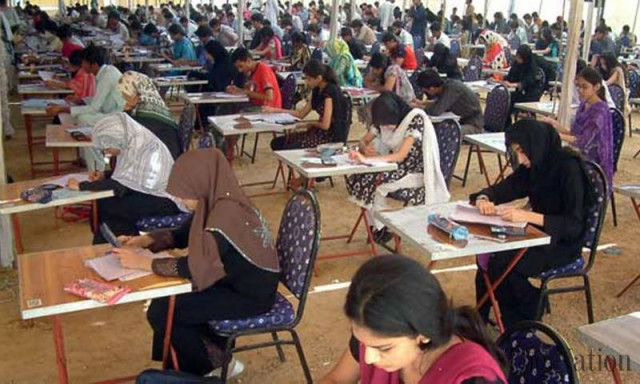Sindh’s public service exams 2013 declared void
2,813 candidates to take fresh test; SC orders induction of new SPSC chief

Top court orders Sindh government to appoint Sindh Public Service Commission chairman within two weeks. PHOTO: EXPRESS
In the 34-page judgment on a suo motu case on the illegal appointments of chairman and members of the SPSC, Justice Qazi Faez Isa observed that the commission was not regularly holding annual tests and examinations as there were gaps spanning many years. The court also wondered that since 1989, the combined examinations had only been held in 1992, 1995, 1998, 2003, 2008 and 2013.
The judgment stated that in the absence of the competitive examinations, initial appointments were made through non-prescribed methods.
“The government should submit a list of vacancies that exist or may become due in the foreseeable future to the commission to enable it to conduct examinations, but the Government does not do so nor the commission calls upon it to do so. Arbitrariness and ad-hocism prevails.”
The commission, the court stated, was not fulfilling its constitutional mandate. Consequently, the pool of competent officers in the government was shrinking, the public is being denied good governance and qualified young men and women of the province were being deprived of opportunities to enter into the civil service.
“If the FPSC can hold examinations annually, including those of the central superior services (“CSS”) and the provincial public service commissions of some provinces can also manage to have competitive examinations every year, then there is no reason that the Sindh commission cannot do so too.”
The court also wondered that 25 posts in urban areas had been left vacant in the CCE 2013 exam without assigning any reason was yet another illegality.
“If through a discriminatory selection process civil servants are selected and appointed, it would infringe Article 27 of the Constitution.”
The verdict stated that the commission and the government were obliged to ensure complete transparency in the process of selection and appointment and anything less was unacceptable.
“Those who have earned the privilege to serve the nation … unlike those whose lodestar is nepotism or corruption. Since taxpayers are paying dearly to be served by the best, they are entitled to get the best. If the incompetent or the corrupt ingratiate themselves into the civil service, citizens are deprived of their due. The hapless taxpayers foot a never-ending bill which includes the salaries and other emoluments of civil servants till they retire, and after their retirement their pensions and other benefits. And they are denied the benefit of competent and honest individuals. Appointments which disregard merit, perpetuate bad governance, and drain the public exchequer; such appointments also erode the credibility of the commission and the government.”
It stated that it also affected the government’s performance, and its brunt was borne by the public. Those given the responsibility to select the best candidates should acquit themselves of the trust reposed in them to the best of their ability and, needless to state, without any fear or favour.
“The Civil Service enables government in its most essential way. A robust and efficient system allows for smooth governance. A weak and corrupt system disables government. Without a properly functioning Civil Service, even the most basic functions and workings of the government become an enormous task.”
Meanwhile, the apex court declared all written tests and interviews for competitive exam held in 2013 under the SPSC null and void and directed the provincial government to freshly appoint chairman and members of SPSC.
A three-judge bench, headed by Justice Amir Hani Muslim, ordered the provincial government to appoint the new SPSC chairman within two weeks.
The verdict called for appointing a “person of integrity and competence who meets the stipulated qualification for the appointment as chairman under Article 242 (1B) of the Constitution within two weeks from the date of the announcement of this judgment”.
The judgment was authored by Justice Qazi Faez Isa.
The court also asked Sindh government to ensure that all members of the commission meet the prescribed qualifications.
“In view of the larger scale ‘illegalities/discrepancies’ committed in written tests and interviews of CCE-2013, the same are set aside and cancelled,” the judgement read, while clarifying that screening test results had not been cancelled.
“Only 2,813 candidates who had earlier taken the written tests of CCE-2013 for the 182 posts be permitted to take the fresh written tests, even if … they have crossed the stipulated upper age … without requiring any additional fee,” the order read.
The bench further observed that when the papers of the written tests are sent for checking, the identity of candidates must be kept anonymous. Marks of the written tests should be publicly displayed on the commission’s website, on the notice board in its premises, and in one Urdu, English and Sindhi newspapers.
Published in The Express Tribune, March 14th, 2017.



















COMMENTS
Comments are moderated and generally will be posted if they are on-topic and not abusive.
For more information, please see our Comments FAQ